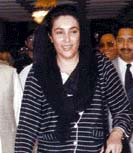Commentary/Mani Shankar Aiyar
An Indo-Pak dialogue will give us something to celebrate in
this 50th year of our Independence
Every once in a decade or so, the opportunity comes our way
of really moving forward on the India-Pakistan dialogue. The recent
elections in Pakistan have provided us with yet another such opportunity.
If we seize it, we might still be able to give ourselves something
to celebrate in this 50th year of not only our Independence but
also theirs.
 We wrongly thought Benazir's first ascension to the prime ministership
in 1988 was one such opportunity. The assumption that it might
be an opportunity rested on the belief that as a modern, post-Partition
Pakistani she might bring to bear a new mind-set on the India-Pakistan
relationship. The belief was strengthened by the refreshing lack
of hang-ups in the approach of her Indian counterpart, the modern-minded,
post-Partition Rajiv Gandhi.
We wrongly thought Benazir's first ascension to the prime ministership
in 1988 was one such opportunity. The assumption that it might
be an opportunity rested on the belief that as a modern, post-Partition
Pakistani she might bring to bear a new mind-set on the India-Pakistan
relationship. The belief was strengthened by the refreshing lack
of hang-ups in the approach of her Indian counterpart, the modern-minded,
post-Partition Rajiv Gandhi.
Benazir, however, proved so much
her father's daughter that she remained mired in Zulfiqar Ali
Bhutto's flawed vision of Pakistan as triumphant only when it
triumphed over India. Ironically, she also proved most accommodating
of the demands and restraints imposed on her by the assassins
of her father -- the armed forces, who left her little room for
manoeuvre. Also, of course, the internal situation in Kashmir
so sharply deteriorated with V P Singh's take-over that Benazir
could not pass up the opportunity of fishing in troubled waters.
Between Narasimha Rao and Nawaz Sharief there was personal rapport,
but it could not be translated into anything historically meaningful
because, first India backed away -- God knows why -- from concluding
the Siachen agreement, which was all tied up, typed up and ready
for signature. The Pak defence secretary, my old friend Saleem
Jilani, was merely asked by his somewhat embarrassed host and
counterpart, N N Vohra, to please pack his tent and depart
into the night. Secondly, we still had to get a grip on terrorism
in Kashmir, which made talking Kashmir with Pakistan just that
much more difficult.
Narasimha Rao made a heroic effort to break out of the cul de
sac in October 1993 when, in his letter of felicitations to Benazir,
he offered to talk to Pakistan about Kashmir and related matters.
This was a U-turn of the highest import in India's diplomatic
posture. The story goes back to the Shimla Agreement of 1972.
There, it was Indira Gandhi personally who, in a last-minute one-on-one
encounter with Bhutto, drafted the clause on Kashmir in the Shimla
Agreement. No civil servant was involved; the foreign secretary,
Tikki Kaul, having actually left Shimla for Delhi, persuaded that
there would be no Shimla Agreement ! The Kashmir clause was a
triumph for Indian diplomacy. For, hitherto, Pakistan had been
insisting on agitating the issue in international fora.
Shimla bound the Pakistanis down to a bilateral dialogue aimed at 'a
final settlement' of the J&K issue. Having secured their
obligation to talk Kashmir with us bilaterally, we have spent
the next 25 years not talking Kashmir to them bilaterally! And
this is what passed for professionalism in the Indian Foreign
Service.
In exactly the same way as Indira Gandhi at Shimla decided to
take matters in her own hands, so also in October 1993 did Narasimha
Rao abandon his customary (and disastrous) Doctrine of Non-Decision
and make the bold move of taking up the promise of Shimla by offering
to talk Kashmir to Benazir.
It is clear from a close reading of
then foreign secretary J N 'Mani' Dixit's Anatomy Of A Flawed
Inheritance and My South Block Years that the very absence of
any reference to the prime minister's breakthrough in those books shows that it was
not a foreign office draft which Rao absent-mindedly initiated,
but a version that emerged full-blown from Rao's own computer.
 It was a Rao initiative to retrieve the ground needlessly lost
over the previous 21 years. A combination of bull-headedness on
the part of the two foreign services with the highest quotient
of bull-headedness in the world, the Indian and the Pakistani,
stalled any progress on the ground. More damagingly, Benazir was
engaged in a last-ditch (but happily doomed) effort to focus UN
attention on alleged human rights violations in Kashmir. She had
neither the wit nor the wisdom to balance embarrassing India at
the UN with taking advantage of the breakthrough Indian offer.
It was a Rao initiative to retrieve the ground needlessly lost
over the previous 21 years. A combination of bull-headedness on
the part of the two foreign services with the highest quotient
of bull-headedness in the world, the Indian and the Pakistani,
stalled any progress on the ground. More damagingly, Benazir was
engaged in a last-ditch (but happily doomed) effort to focus UN
attention on alleged human rights violations in Kashmir. She had
neither the wit nor the wisdom to balance embarrassing India at
the UN with taking advantage of the breakthrough Indian offer.
We too shied away shamefully from taking up the Pakistani non-papers
or even bringing the Pakistanis to a discussion on our own. The
noora kushti that followed might have earned JS (Pak) his salary
has not contributed one little mite to the resolution of the
problems on the ground.
Tell us what you think of this column
|





